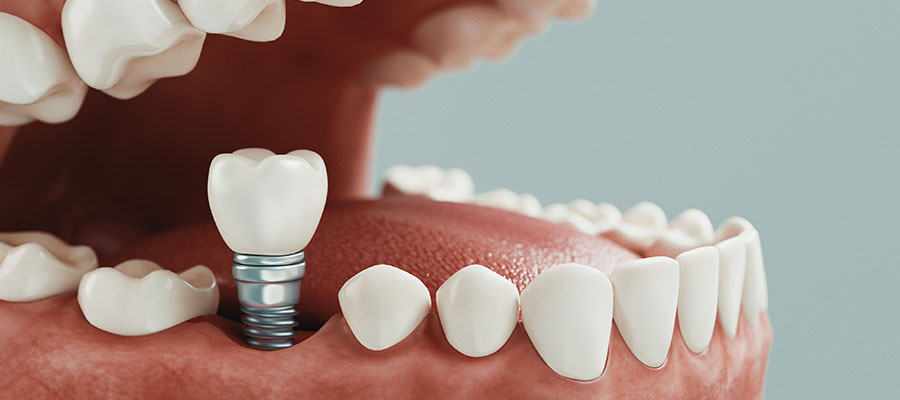


A dental implant is a titanium screw that is placed in the jaw to act as an anchor for a false tooth (an implant crown) or a set of false teeth (an implant bridge or denture), functioning in a similar way to a natural tooth root.
You will be requested to fill the necessary documentation that will give us more information about yourself, your medical history and dental history. Dr Borman will consult you to evaluate if you are a candidate for dental implant treatment. We also want to listen and understand your desires and concerns about your dental care. Only then will we be able to provide you with the excellent care you deserve.
During this appointment, the necessary x-rays will be taken, but does not include a CBCT scan for a more detailed evaluation of the available bone.
Consultation cost is R 577 (excluding x-ray photos or CBCT). Cost for one x-ray photo is R 178 and CBCT scan is R803
The surgical procedure can be done in the rooms under local anaesthetic and is generally not at all painful.
Conscious sedation is also an option for a more comfortable experience (additional costs to the medical seditionist).
During the surgical procedure, the implant will be placed into the jaw. The gum will be stitched back into place after which a healing period of about 3 months is allowed for the implant to integrate. Discomfort after surgery is different from patient to patient & usually relate to the stitches. After the healing period, fabrication of the implant crown can be started.
Sometimes an additional surgery might be needed if the implant needs to be exposed if left underneath the gum. This is usually due to weaker than suspected bone quality and will be discussed before the start of the surgical procedure or after the surgical placement of the dental implant.
Cost of surgical placement of the dental implant R 10 500
Cost of additional exposure surgery after the healing period of 3 months R 2 500
The procedure of building up the bone is known as Bone Grafting. Bone Grafting is a very common procedure in dentistry and is used extensively in dental implant procedures. A shortage of bone can be overcome by using a variety of materials which can either be placed at the time of implant placement or as a separate procedure prior to implant placement.
Cost of bone grafting R 3 000
In certain cases, the infected or broken tooth can be removed, and a dental implant can immediately be surgically placed.
This will save time on the waiting period after the tooth removal before placement of the implant.
Cost for normal extraction R 2 000
Cost for more complicated extraction R 3 500
In most of these cases, the dental implant will need to be supported by bone grafting as discussed earlier.
After a healing period of 3 months, the process can start for the fabrication of a dental implant crown. This entail two appointments, usually one week apart, during which the necessary impressions will be taken, and the dental implant crown be fitted unto the implant that has been surgically placed.
If you have been referred to Dr Borman for the placement of the dental implant, you will be referred back to your dentist to start the process of fabricating the crown, after the necessary follow ups with Dr Borman.
For implant bridges or implant dentures, the appointments can be more as these turns into more advanced dentistry.
Cost for implant crown R 12 500
Cost for implant bridges and dentures need to be individually determined, depending on the clinical scenario.
Dental implants, like normal teeth are susceptible to infection if good dental hygiene is not maintained. Following successful implant treatment, patients should be offered an individualized supportive care program. Systematic & continuous monitoring of peri–implant tissue conditions is recommended for the diagnosis of peri-implant health & disease. This is usually 4 monthly visits to the dental hygienist and yearly visit to the dentist. Proper dental hygiene maintenance products will also be offered if the need arise.
Do take note that Dr Borman is not a specialist in periodontics or maxillofacial surgery, but a general dentist with post graduate training in dental implantology.
Dental implants have a high success rate, but some people experience dental implant failure. It's estimated that about 5 to 10 percent of dental implants fail, either shortly after a procedure or months or years later
Dental implant surgery only done at our Somerset West office.
For any questions, please feel free to contact us.
Visit our practice
Somerset West:
19 Lourensford Road, Somerset West.
Stellenbosch:
Unit 2, Oewerpark, Rokewood Avenue, Stellenbosch
Give us a call
Somerset West:
021 851 4318
Stellenbosch:
021 887 0047
Chat on Whatsapp
Somerset West:
062 709 1302
Stellenbosch:
069 906 0857